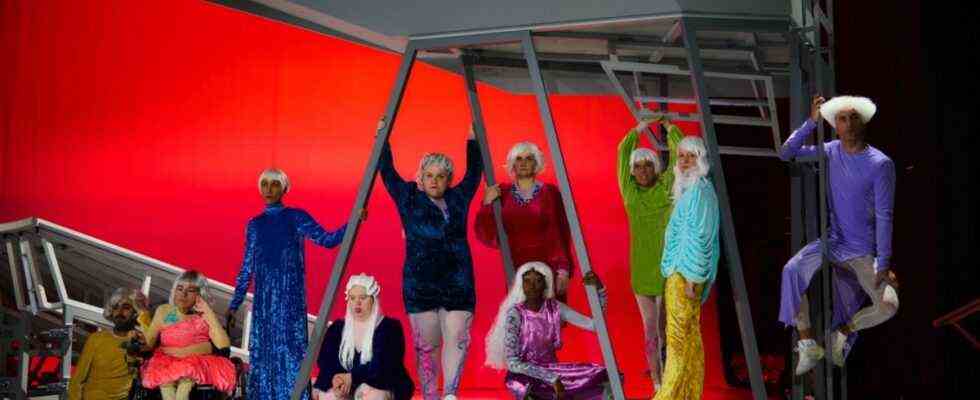Plea by Sophia Goudstikker. In 1898 she defends a waitress who aborted her child because she did not know how to feed it. Five years imprisonment threaten: “Do you think that if you as a man and all your colleagues around you could bear children, that the legal situation would be exactly as it is at the moment? The act of childbirth would probably be hyped up to a heroic epic, sagging breasts to Signs of archaism and power, the rupture of the dam would have the sound of a roar of victory, and stretch marks would be worth more than the accumulated scars of all war injuries over the past 2,000 years. “
In the German Empire, women were supposed to crochet, embroider and, above all, have children, preferably boys, who could then be shot to death in wars. A woman who was not married and a mother when she was 30 was considered an old maid. The woman practically had no rights to her husband, and she should keep her mouth shut anyway. At the end of the 19th century, some clever, self-confident women no longer wanted to accept any of this. Not even in Munich. The theater evening “Bavarian Suffragettes” in the Münchner Kammerspiele is about them. Jessica Glause staged it with the help of a women’s ensemble bursting with enthusiasm for play.
The Bavarian suffragettes never existed. The title is borrowed from the women’s movement in Great Britain and the United States, which at around the same time stood up quite firmly for women’s rights while the men shook with fear. Women who want to vote, work, study! Male privileges are quickly lost, especially when the argument for privilege is only privilege itself.
“Bavarian Suffragettes” in front of the video portrait of the smoking Schwabing salon lady Fanny zu Reventlow (Svetlana Belesova).
(Photo: Julian Baumann)
Some women in Munich were fed up with these conditions. Jessica Glause went in search of them together with nine actresses and one actor, Thomas Hauser, built a text from their writings, speeches and letters, enriched it with personal texts by the actresses and grabbed the retro-agitational music by Eva Jantschitsch to. The result is two hours of very lively history lessons full of details that are today stunned. But: Today shimmers through in the partly choral, especially by Jelena Kuljic, as always gorgeous songs. The processing of history could unintentionally have a strange affirmative effect, in the sense that compared to the situation 120 or 130 years ago, the position of women today is quite wonderful.
The nucleus at that time was the Elvira photo studio, where the American Consulate General is today. As a gainful activity, photography was too young to be a male domain, Anita Augspurg and Sophia Goudstikker, embodied by the exuberant Annette Paulmann and the angry Katharina Bach, used it for sensational business success, even members of the royal court were photographed there. The two ladies were also a couple in private, rode through the English Garden in the manor house, were avant-garde, but they were not allowed to act politically. Finally, they put an Art Nouveau relief on the facade of the studio, a tangled dragon that the Nazis had chopped off as soon as they were in power.
Now the dragon rises again, is assembled on the stage from ramps and inclines as a huge sculpture, on and around which this fabulous women’s ensemble is active, motley, women of all facets, first in leotards with crochet appliqués, later wrapped in velvet. The linguistic, agitational force is enormous, speech replaces psychology.
The dazzling Fanny zu Reventlow saw the eroticism endangered when women work
In other cities in Germany one was already further, from Weimar or Karlsruhe came the idea of founding the “Society for the Promotion of the Intellectual Interests of Women” (1894). It is by no means homogeneous, Augspurg is studying law in Zurich and wants to help the big, idealistic whole, Goudstikker very pragmatically, also women workers. Loves break, new ones arise, headwinds also come from women: Fanny zu Reventlow, dazzling Schwabing salon lady (embodied by the absolutely great Svetlana Belesova), sees the eroticism endangered when women work.
Finally, there is the first Bavarian Women’s Day in 1899. Ludwig Thoma comments that the movement emerges “from Grete’s Weltschmerze, who has no Hans”. But in 1908 women were allowed access to education. For the right to vote, however, the revolution of 1918 was needed first.
Much achieved, and yet everything perishes. Anita Augspurg helped organize a peace conference in The Hague, warned about Hitler, was expropriated in 1933 and fled to Zurich. Like others, Carry Brachvogel, founder of the Munich Association, was banned from working and was deported to Theresienstadt in 1942, at the age of 78. This can be continued for a long time. In post-war Germany a married woman needs the permission of her husband if she wants to work. And today men keep beating their wives to death because they consider them their property. But that doesn’t happen in the play. That ends at the grave of the writer Helene Böhlau. “Create your world; as you create it, so it is.”

